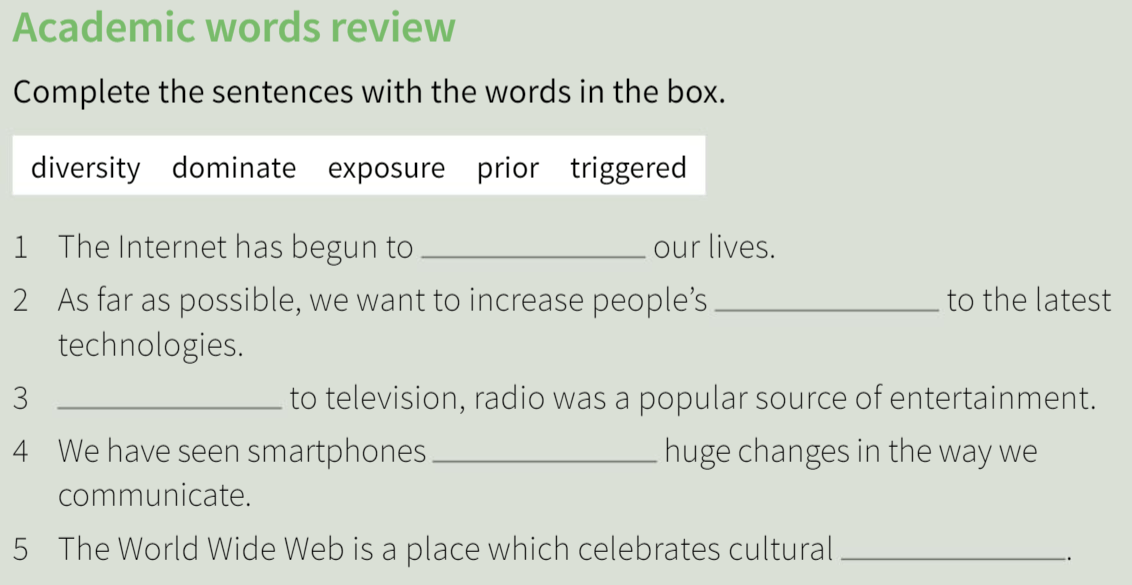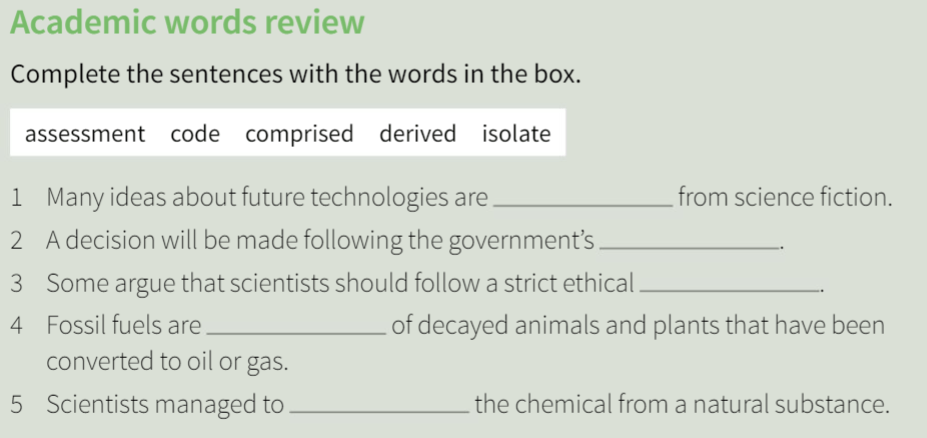to control something or someone, often in a negative way, because you have more power or influence
dominate
the smallest unit of any substance
atom
What is a relative clause?
A relative clause is a type of dependent clause that typically modifies a noun or pronoun and provides additional information about it. It is introduced by a relative pronoun (such as who, whom, whose, that, or which) or a relative adverb (such as when, where, or why).
S + will have + past participle + ...
We will have finished the tests by the end of next week
IELTS Writing: Is it important to address all parts of the question?
Yes. Addressing all parts will give you a band 6 or higher depending on how well you answer the question.
The sight of danger can _ different responses in animals.
1 comprise (v)
2 device (n)
3 dominate (v)
4 insight (n)
5 phenomenon (n)
6 prior (adj)
7 thereby (adv)
8 trigger (v)
trigger
Opponents of nuclear power think we should look for a safer, renewable _ of energy.
source
A defining relative clause (also called a restrictive relative clause) provides essential information about the noun or pronoun it modifies. It limits the meaning of the noun or pronoun by identifying or specifying which person or thing is being referred to. A defining relative clause is not separated from the rest of the sentence by commas. For example:
When do we use the present perfect?
to talk about something that will be completed before a specific time in the future.
What kind of IELTS writing did we practice in term 4?
Task 2 - Direct Questions (2 questions) essay.
It is important to _____________ the correct dosage of medication for each patient.
The teacher asked the students to _____________ the key points in the text.
1 calculate (v) 2 classify (v) 3 compose (v) 4 criticize (v) 5 observe (v) 6 propose (v) 7 signal (v) 8 underline (v)
calculate - underline
devastating / exaggerate / efficiency effectively / concerned / deteriorate
1. The _____________ effects of climate change are becoming more and more apparent with each passing year.
2. he company is _____________ about the safety of its employees, and takes every precaution to avoid accidents.
devastating / concerned
My friend John, who lives in London, is coming to visit me next week.
defining or non-defining?
non-defining
She _____ (finish) her exams by then, so we can go out for dinner.
will have finished
What are the 2 topics that you might get on your writing task?
Sound/Future
Prior to the experiment, the scientist proposed to use a new ___ that could effectively ___ the behavior of subatomic ___ and thereby provide new ___ into the phenomenon.
criticize - device - particles - insight - comprise - dominate - trigger - underline - observe
Prior to the experiment, the scientist proposed to use a new device that could effectively observe the behavior of subatomic particles and thereby provide new insight into the phenomenon.
revolutionary (adj) stagnant (adj) tackle (v) threat (n) discovery (n) evaluation (n) force (n) obsolete (adj) particle (n) poverty (n) property (n)
The _____________ of a new _____________ may _____________ the problem of _____________ and provide a _____________ solution.
The discovery of a new particle may tackle the problem of poverty and provide a revolutionary solution.
Athletes train for months to improve their endurance and strength, _________ helps them win championships.
which (that is not used for non-defining clauses)
By October, I (study) English for 3 months.
will have studied (been studying)
What topics can you choose from for your speaking?
Prompt 1: How important is sound in animal communication?
Prompt 2: Should sound and technology be considered pollutants?
Prompt 3: How has technology affected the types of relationships people have?
Prompt 4: Why do you think it is difficult to predict the future?
Prompt 5: Will future technologies change the way we live?
You have to get ALL 5 correct!

dominate, exposure, prior, trigger, diversify
 You have to get ALL 5 correct!
You have to get ALL 5 correct!
derived, assessment, code, comprised, isolate
The professor, _____ I met at the conference last year, offered to write me a letter of recommendation.
whom
Note that "whom" is the object form of the pronoun "who," and is used when referring to the object of a verb or a preposition. In this case, "whom" is used because the speaker met the professor, making the professor the object of the verb "met."
If you can replace the word with he or she or another subject pronoun, use who. If you can replace it with him or her (or another object pronoun), use whom.
Both are correct but what's the difference?
I will finish my dinner / I am going to finish my dinner. (future simple)
I will have finished my dinner by 7 p.m. (future perfect)
Time is not important - 7 p.m. is irrelevant so I don’t need to use the future perfect.
Time is important - Maybe someone wants to call you at 7. You use the future perfect to express that you will have finished your dinner before then.
What topic did you choose with your team?
The team confidently say the prompt without hesitation.